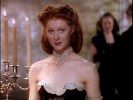Eye For Film >> Movies >> The Red Shoes (1948) Film Review
The Red Shoes
Reviewed by: Jennie Kermode

Some stories are made to be told and retold, each version offering something new yet echoing something ancient. Hans Christian Andersen knew how to craft such a story, creating The Red Shoes, a fairytale about a dancer possessed by her footwear and forced to dance to her death. In 1948, Emeric Pressburger updated it to produce one of the most important and powerful films of the era, and now that film has been digitally remastered for a new audience. It's as compelling as it ever was.
Moira Shearer is Vicky, the ambitious young ballerina determined to make a name for herself. Anton Walbrook is Boris Lermentov, owner of a famous ballet company, the man who offers to make her a star. Marius Goring is Julian Craster, the composer whom he commissions to update a ballet version of the Hans Christian Andersen tale, and the man with whom Vicky falls in love. Naturally Lermentov, despite his cynical personality, has by this point also become obsessed with her, so a bitter love triangle develops. But the real thing tearing at Vicky is the sense that she must choose between human happiness and her own obsessive commitment to her art.

It is this focus on Vicky's character that lifts the script above its peers. Vicky is no typical distraught heroine waiting for a man to take pity on her. She has a forceful personality of her own - it is initially this, rather than her dancing, that impresses Lermontov - and it is this that ultimately drives her toward self destruction. Lermontov's plight is framed by a motto he explains to Craster early on when another composer has pilfered parts of the young man's work - that it is far more heart-rending to need to steal than to be stolen from - and Walbrook's nuanced performance means that we can feel for him even at his cruellest, when the very strength of his feelings seems to make it impossible for him to express them directly. Meanwhile the charming young composer is given depth by a cruel and demanding streak of his own. Supporting characters have their own complex relationships and rivalries (gay subtexts barely concealed) and there's an astute understanding of what it's like to work in a creative team full of people at the top of their fields. There ought to be, because the cast and crew of this film were alike at the top of theirs.
The other stand-out feature of The Red Shoes is its sheer beauty. Exquisitely framed and shot in dazzling colour, with the shoes themselves standing out vividly in landscapes of blues and greys, it features fabulously innovative set design and montage work. The dance sequences are brilliantly performed and well worth watching the film for in their own right, but non fans will still find them easily accessible - they enhance, rather than delay, the larger drama. The costumes are stunning and help to make the transitions between actors playing characters and actors playing characters who are playing characters seamless, even as we see Vicky apparently subsumed by the tragic character she plays.
Obviously, given this film's age, some sequences now come across as old fashioned and quaint, and factors like Vicky's upper class background fit more awkwardly into the story than would originally have been the case, but it's surprising how well the central story still works today, probably because it draws on aspects of human nature too fundamental to change. It remains highly watchable and audiences seeing it for the first time can reasonably expect to find themselves in awe.
Reviewed on: 09 Dec 2009

















